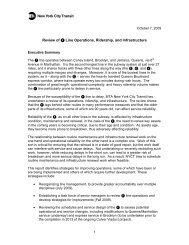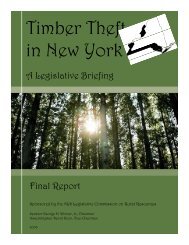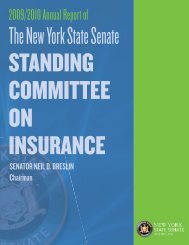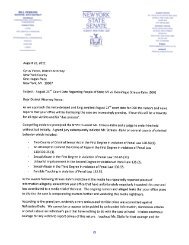Crime Committee Report e.indd - New York State Senate
Crime Committee Report e.indd - New York State Senate
Crime Committee Report e.indd - New York State Senate
Create successful ePaper yourself
Turn your PDF publications into a flip-book with our unique Google optimized e-Paper software.
XIX.<br />
2011 Reentry Legislative Agenda<br />
S.2655 VOLKER, HASSELL-THOMPSON, SCHNEIDERMAN<br />
Incorrect Arrest Warrant Information<br />
This bill will create a procedure to validate and ensure the accuracy of a person’s permanent<br />
criminal record as maintained by the Division of Criminal Justice Services (DCJS) as it relates<br />
to all warrants issued as part of a criminal proceeding. The proposed legislation adds a new<br />
subdivision 7 of section 530.70 of the criminal procedure law creating a process whereby DCJS<br />
is to verify criminal record information where certain arrest warrant information contains contradictory<br />
information. DCJS is required to contact various law enforcement entities and the<br />
courts in order to clarify the contradictions. In the event no information is forthcoming, the<br />
arrest warrant will be deemed recalled.<br />
S.5223 SCHNEIDERMAN<br />
Undisposed Case Information<br />
This bill will require the Division of Criminal Justice Services and the Office of Court Administration<br />
to refrain from including undisposed case information on criminal history record<br />
reports except for law enforcement and other specified purposes.<br />
The proposed legislation adds a new section 845-c to the Executive Law to Prohibit DCJS<br />
from including undisposed case information on criminal history record reports (i.e., rapsheets)<br />
where the report is produced for non-law enforcement or non-criminal justice purpose.<br />
The bill defines “undisposed case” as a criminal action or proceeding or an arrest incident<br />
that appears on an individual’s criminal history record for which no conviction, sentence or<br />
other final disposition (other than an apparently unexecuted bench warrant) appears and<br />
with respect to which no entry has been made on the DCJS record for a period of at least 24<br />
months. The prohibition also would not apply to records produced by DCJS solely for bona<br />
fide research or internal recordkeeping purposes. The bill establishes a corresponding requirement<br />
for OCA. It adds a new paragraph (s) to subdivision two of section 212 of the Judiciary<br />
Law to require OCA to refrain from reporting undisposed cases on criminal history reports it<br />
produces except where the report is prepared for internal recordkeeping or bona fide research<br />
purposes. The bill provides that the act shall take effect 180 days after it shall have become a<br />
law, and further provides that, prior to such effective date, DCJS in consultation with OCA shall<br />
undertake measures to update its criminal history records with respect to cases that have no<br />
final disposition reported.<br />
S.4368 HASSELL-THOMPSON, DIAZ<br />
Toughening Article 23-A<br />
The bill amends the correction law to revise the definition of “direct relationship” and to<br />
establish that a denial of employment or a license based on a criminal record, must be based<br />
on the connection between the specific duties or responsibilities of the job or license and<br />
the nature of the criminal conviction and such connection must create an unreasonable risk<br />
to property or public safety. Section 753 of Article 23-A requires a public agency or private<br />
employer to consider eight factors together when considering license or employment matters.<br />
These factors include the bearing, if any, the criminal offense for which the person was previously<br />
convicted will have on his fitness or ability to perform one or more duties and another<br />
factor is the seriousness of the offense. Thus, it is clear that the law mandates accountability<br />
and requires an employer to articulate a nexus between the job responsibilities and the nature<br />
of the crime and a nexus between the prior conviction and the public safety. This amendment<br />
seeks to clarify the operation of law.<br />
Standing <strong>Committee</strong> on <strong>Crime</strong> Victims, <strong>Crime</strong> and Correction | 2009-2010 <strong>Report</strong> 59









![[PDF] Proposed MTA Capital Program - New York State Senate](https://img.yumpu.com/24854139/1/190x245/pdf-proposed-mta-capital-program-new-york-state-senate.jpg?quality=85)






